Disjointed approach hampers hooligan crackdown
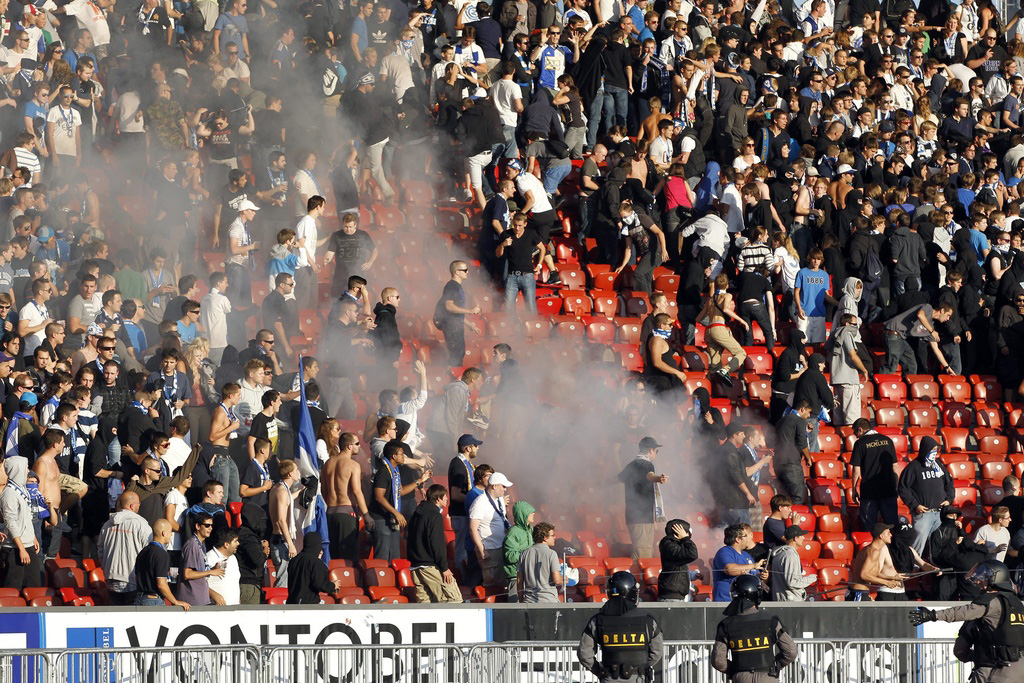
The abandonment of a local football derby in Zurich at the weekend has once again raised questions about how Switzerland is dealing with hooligan violence at matches.
Sunday’s game between FC Zurich and Grasshoppers ended 15 minutes from time as rival fans clashed. Some measures recently introduced to combat the problem have run into a wall of poor coordination, according to observers.
Last year, cantonal governments and the football authorities clamped down on alcohol sales at grounds and vowed to upgrade video surveillance, the deployment of police observers at matches and extend a database of known hooligans.
The database and other measures were instigated by violence between FC Zurich and FC Basel in 2006 and were put into place in time for the Euro 2008 football tournament, which Switzerland co-hosted with Austria. But they appear to have had a limited effect, with the database logging 645 hooligans by the middle of last year.
Sunday’s violence marked a new low, with Swiss Football League (SFL) spokesman Roger Müller calling it “disappointing” and acknowledging that it had “made life tough for us”.
The SFL would work tirelessly to bring the miscreants to court, Müller added.
He also admitted that several measures, many of which have been copied from other countries, had failed to make an impact.
Joined-up failure
“Implementation of ideas is a bigger issue and can only be achieved with intense cooperation between the football league, the clubs, police, transport operators and local authorities,” he told swissinfo.ch.
“This is a very complicated process and we lack clear-cut rules and guidelines to work from. Coordination is not where it should be in quite a few places.”
This problem was highlighted just last month when a conference organised by the federal sports ministry dissolved into indecision with the 26 cantons being told to come up with their own strategies.
Fed up with seeing their trains vandalised at weekends, Swiss Railways has struck out on its own course by seeking a ban on travelling supporters.
A more serious hooligan problem in England in the 1970s and 1980s was only resolved after two major disasters forced the government into evolving a national strategy, according to John Williams, professor of sociology at the University of Leicester.
The lives lost at the Heysel stadium violence in 1985 and then the Hillsborough disaster four years later prompted a judicial review that recommended such a coordinated nationwide plan.
Embarrassing image
Many of these recommendations – including a hooligan database, banning violent fans, mobilising the help of peaceful supporters groups and introducing video surveillance – have also been taken on by the Swiss.
In addition, several Swiss stadiums have been upgraded or rebuilt and families have been actively encouraged to come to games.
But none of these schemes can be fully effective unless they are properly rolled out across the country in a fully organised way, according to Williams.
“England had a much more serious situation than we are seeing in Switzerland. It took major catastrophes to force a coherence in national policy that had previously been lacking,” he told swissinfo.ch.
“England now looks at countries such as Italy and wonders why they are stuck in the same situation that we had 20 years ago. The British government got involved because hooliganism was following the national team, creating an embarrassing image of Englishmen abroad. The government realised it couldn’t sit back any longer.”
Mobilising fans
Another reason the English hooligan problem calmed down was the infusion of huge amounts of money by satellite television companies in the early 1990s. This allowed clubs to successfully market the sport to other sections of society, such as middle-income families.
Switzerland is unlikely to attract such vast sums of money, but clubs are working with fans to gentrify the sport. This includes encouraging fans to join in goodwill schemes such as the anti-racism campaign.
But even here, some attempts have been more successful than others, according to fan worker Urs Frieden of FC Young Boys Bern.
Previous top-down models funded solely by the football authorities fizzled out, but the Young Boys scheme has prospered thanks to involvement from other stakeholders.
“Our model is a bottom-up approach that brings fans together with different participants,” Frieden told swissinfo.ch. “The club, youth workers and the canton collaborated to set up a fans association and to secure funding from several sources.”
The problem of fan violence is not restricted to football in Switzerland. Ice hockey has also gained a poor reputation for bad behaviour among supporters in recent years.
Football was dragged into the mire on the final day of the season in 2006. Basel and Zurich fans clashed in the stadium and in Basel after a dramatic title-deciding game.
In response, the Football League made clubs responsible for their travelling fans at away matches and for issuing tickets for those games. A raft of other measures have been introduced (see text) in the meantime.
But this has not stopped the violence. After a quiet year in 2008, 20 fans from Young Boys Bern and FC Sion were banned for up to three years for acts of violence and using fireworks at a match. Young Boys were also fined and had to restrict fans’ entry for their first match of the following season.
Sion and Lucerne fans also fought on the pitch after a cup semi-final match in 2009. Basel and Zurich fans have persistently caused disturbances in each other’s cities on match days.
On October 2, the match between Zurich and Grasshoppers was abandoned by the referee after a flare was thrown by a fan into a rival supporters’ enclosure – sparking violent scenes.
The head of Zurich city’s sports department Gerold Lauber has called for a “zero tolerance” nationwide ban of flares and fireworks at matches.

In compliance with the JTI standards
More: SWI swissinfo.ch certified by the Journalism Trust Initiative

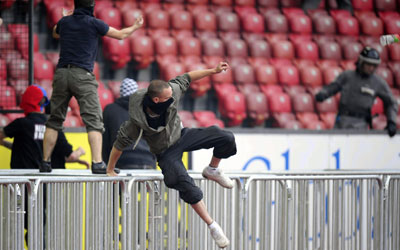
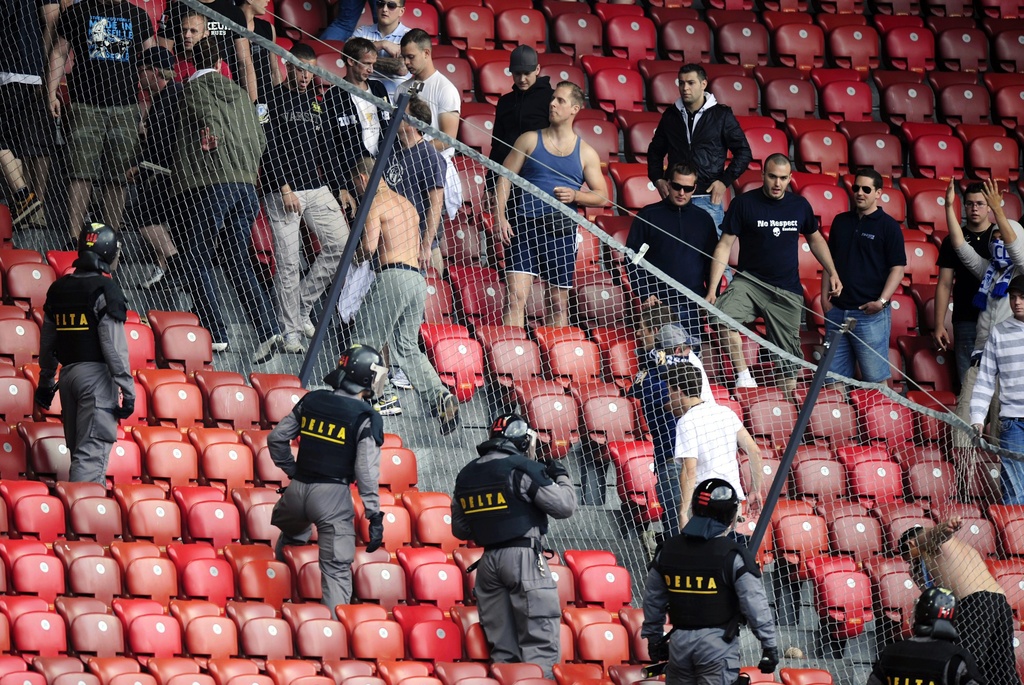
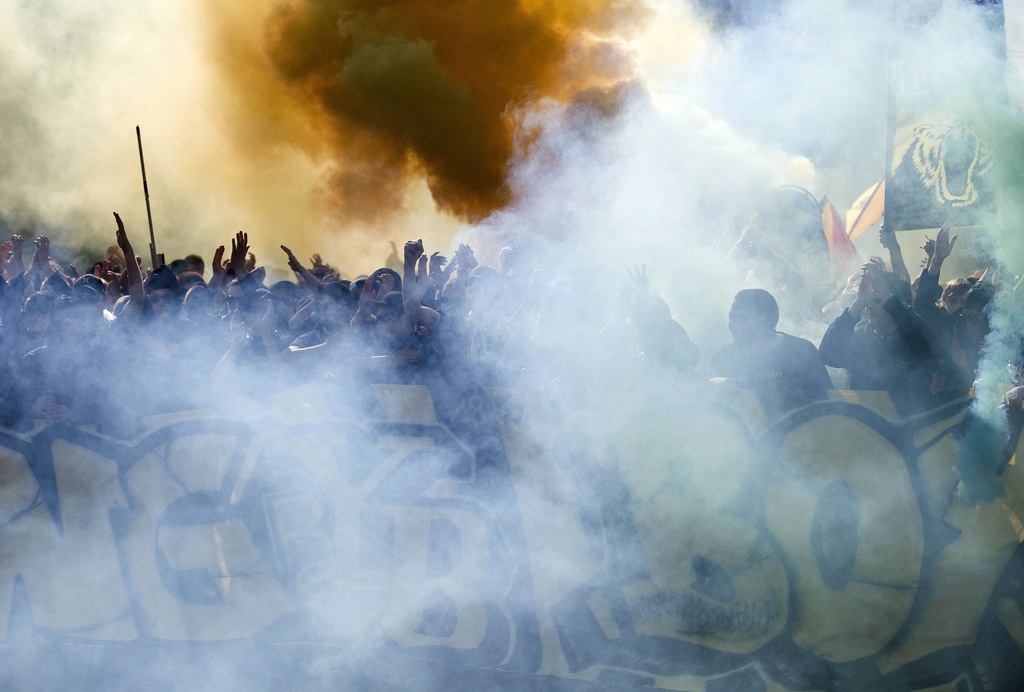
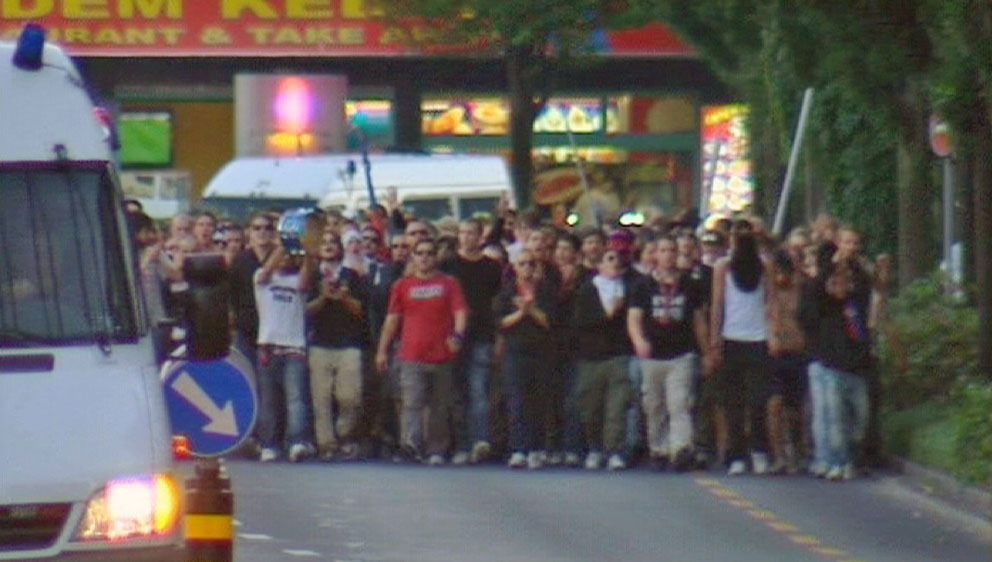
You can find an overview of ongoing debates with our journalists here. Please join us!
If you want to start a conversation about a topic raised in this article or want to report factual errors, email us at english@swissinfo.ch.